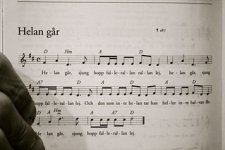What an interesting question!
I just had a piano lesson with a focus on playing by ear.
I never had such a lesson, not one explicitly called that, anyway, on any of violin, piano, or accordion - from a dozen different teachers across four decades.
Far as I knew, it was one of those things you either did-or-didn't-do, but couldn't really be taught, though you can get better at it by practicing it.
[Edited to add: now, there IS usually a companion class to music theory for freshmen and sophomores called 'ear training', which is equal parts taking melodic dictation and learning to sing back what you've written. But in my limited experience with it -- I wasn't a music major -- a) you didn't do it with your instrument, you did it sitting in the theory classroom and b) it was all about correctly writing it down and then about correctly singing what was written, which is quite different than playing, or singing, by ear.]
Do you use theory and harmony when playing melodies by ear?
Yes. I have to. Before I studied a lot of music theory, I had no ability whatsoever in that direction. Afterward, I knew enough of what patterns were likely to be present that the range of possibilities was much reduced (assuming a simple tonal piece) and I was reasonably likely to be able to identify the next note in sequence in two or three tries.
When I compose, I hear an idea in my head, but don't know what the note-names, or most of the intervals, are. I write it down on unlined paper to see the contours of it, then take a stab at what I think the harmony is, then at what notes I think the melody had. It can take some hours, and of course where I finish is not necessarily the same place I started.
When I try to write down someone else's idea, the process is the same, but I don't have the advantage of hearing it in my head and I can't change it if I find something different that I like better partway through. Heh.
Re the analogy to children learning how to speak - a person who knows how to play by ear can certainly play a Simon-says type of game with a student and see if the student gets better at it with time... maybe if you do that young enough and often enough that's how playing by ear becomes a habit... but I don't know whether that's how people try to teach playing by ear to older students, or if there is some method behind the madness. (Maybe that really is the only way people are taught to play ear, and that's why I've never seen anyone teaching a roomful of otherwise-experienced adults how to do it.)
Re Suzuki:
I wouldn't assume that just because learning by ear came up, this is a Suzuki teacher - nor that Suzuki method is entirely about learning by ear.
Suzuki did start with the idea that people could learn to play before they could read music, in the same manner as they learn to speak before they could read words. (As it happens, I started violin, by Suzuki method, before I could read.) Perhaps some students do learn entirely by listening to their teachers and imitating the finger placements and bow movements. As it happens, we always had the music in front of us, and it was more a matter of me learning to equate a note on the page with a finger placement, even if I didn't know its name, and seeing the pattern of notes as a reminder of the pattern of movements I was supposed to memorize -- so I learned to read music before I could read English. After working through about 2 books of Suzuki I had some ability to sight-read new music from the printed page. Ten years of it did nothing to teach me anything about playing music by ear that I had never seen written down.
Your mileage may vary, of course. But I've known some number of Suzuki and non-Suzuki musicians, and some number who could improvise and play by ear and some who couldn't, and not noticed a correlation. (The pattern I did notice was that most of us who focused on classical for many years were spectacularly bad at improvisation and playing by ear, compared to even a relative beginner in a jazz or folk band.)


